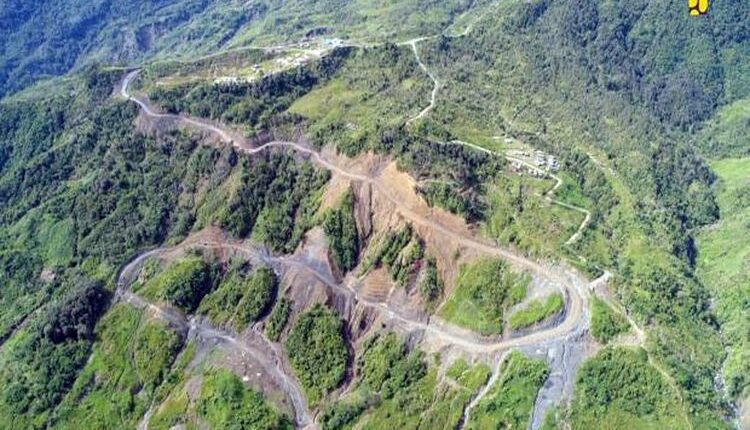Infrastructure Development Improves the Welfare of the Papuan People
Development in Papua, especially in the context of industrial development, has become the government’s main concern in the era of President Joko Widodo’s leadership. The President’s working visit to Papua on November 23 2023 marks concrete steps taken to encourage growth and development in the region.
President Joko Widodo started his visit by attending the 2023 Cendrawasih Bay Sail Peak Event in the Semau Beach Area, Biak Numfor Regency, Papua. In his speech, he highlighted the potential for abundant natural wealth in Papua and expressed his hope that the event could introduce Papua to the national and international level. According to him, this will be an encouragement to increase the number of tourists, event creators and investor interest in Papua.
The importance of connectivity and infrastructure in Papua is the President’s main focus, which was acknowledged through his statement regarding the difficulty of accessibility in the region. In the inauguration of Siboru Airport and Douw Aturure Airport, Fakfak, Jokowi described positive changes in Papua’s accessibility situation. He saw that development in Papua was increasingly developing, and to support economic growth and activities, better transportation facilities and facilities were needed.
Concrete steps in building connectivity in Papua can be seen through the construction of Siboru Airport and Douw Aturure Airport. President Jokowi believes that the existence of these two airports will improve connectivity in Papua, opening air access from the West Papua region to various areas such as Timika, Kaimana, Amahai, and Bintuni. Jokowi also encouraged local governments and the community to make good use of airport facilities, introducing Papua’s tourism potential and destinations to the outside community, especially tourists.
The highlight of President Jokowi’s visit was the inauguration of the National Strategic Project (PSN) for the Fakfak Pupuk Industrial Area in Fakfak Regency, West Papua. In his speech, Jokowi explained that the development of a fertilizer industrial area in Papua was chosen because it is close to a gas supply source, and in the future it can support the big plan to build food storage in Papua. This project is expected to not only meet fertilizer needs in Papua but also support fertilizer needs in eastern Indonesia, such as Maluku and North Maluku.
The President emphasized that the development of the fertilizer industry in Papua is not just an infrastructure project, but part of Indonesia’s grand strategy in upholding food sovereignty. In a situation of global uncertainty, especially related to international conflict, having independent food resources is crucial. President Jokowi is aware that the threat of a global food crisis could affect Indonesia, and therefore, steps such as building a fertilizer factory in Papua are considered a strategy to anticipate this risk.
The construction of a fertilizer factory in Fakfak, West Papua, is considered to have a positive impact in reducing the disparity in fertilizer prices that has previously occurred with Java. With the existence of a fertilizer factory in Papua, it is hoped that fertilizer needs in the region can be met at more affordable prices, which in turn will support the growth of the agricultural sector in Papua. Apart from that, this project also opens up opportunities to increase Indonesian urea fertilizer exports to Pacific countries, such as Papua New Guinea and the Solomon Islands.
President Jokowi emphasized that the development of the fertilizer industry in Papua is not only to meet domestic needs but also to increase the productivity of crops such as rice, sugar cane and corn. Fertilizer is considered an important element in reducing production costs and increasing agricultural yields in Papua.
With an investment of around IDR 30 trillion, this fertilizer factory is expected to have a production capacity of up to 1.15 million tons of urea fertilizer and 825 thousand tons of ammonia annually. The target is to complete construction within the next 5 years. The success of this project is expected to support Indonesia’s food security by providing 4.5 to 5 million tons or 70-80% of the national urea fertilizer needs in 2038.
The importance of this project is also emphasized in the context of human resource (HR) development in Papua. The President considers that this is a good opportunity for the young generation in Papua to take part in the development of the fertilizer industry and actively contribute to the development of their regional economy.
Overall, development in Papua, especially the development of the fertilizer industry, is not just an effort to improve infrastructure and the economy in the region. This is part of the Indonesian government’s grand strategy to maintain food sovereignty and develop the agricultural sector independently. Concrete steps such as building airports, transportation infrastructure, and fertilizer factories show the government’s commitment to bringing Papua to the national and international level, making a significant contribution to food security, as well as opening up new opportunities for economic and human resource development in the region.
